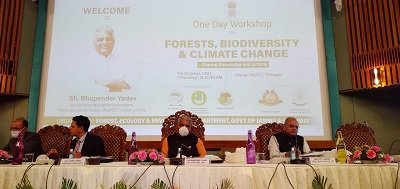Agritech has enabled the promotion of sustainable farming practices, reduction of crop wastages etc besides promoting farmer income
The opportunities that agritech presents before the farming community in the country today are revolutionary in more ways than one. As the Indian farming system undergoes a tremendous shift in the way fresh produce is farmed and reaches the consumer, it is the farmer who stands to be empowered.
Agriculture in India is at the crossroads of an important change. It is witness to a transformation that involves agritech which has enabled the promotion of sustainable farming practices, reduction of crop wastages and crop protection, strengthening connections of the domestic and international market besides importantly improving farmer income.
Rural push
Maintaining sync with its increased globalised position, India has realised the importance that modernising agriculture holds, right from handling growing demand to keeping up with other markets internationally. Access to information on what to produce and when modern agricultural techniques and technology have led to the creation of an e-commerce marketplace for clean and healthy farm produce.
Several steps towards innovation in agriculture have managed to arrest a decline in last-mile delivery to farmers that was putting pressure on the system. It is this transformation led by agritech that has given a push to clean rural cultivation and brought in successful concepts like farm-to-mill, farm-to-fork, and farm-to-warehouse, etc. Over time these models have been able to efficiently link farmers to the marketplaces and thus consumers leading to an urban sustainable farming revolution unfolding.
Specific targeted corrective action has also become possible with agritech. Optimisation of input, reduction in the use of water, chemicals, and pesticides through this action has led to a reversal of damage caused to the ecosystem.
Making it a reality
The emergence of online platforms capable of providing these efficient linkages to farming has proven to be a boon. They are now providing relevant and innovative solutions to the agriculture sector. A mechanism of the agricultural value chain, thanks to the emergence of agritech, these platforms have led the way to innovative ideas and affordable solutions.
In establishing itself, agritech in India has proved to be the missing link between farmers, wholesalers, retailers, and consumers connecting each of them and providing strong marketing linkages and timely quality produce. In the start-up ecosystem, agritech platforms assume a key role in touching every stage of the agricultural value chain. The revolution in this space is brought about through innovation and providing simpler solutions to existing challenges.
Technology has resulted in earth-friendly agriculture being adopted on a larger scale. The use of land, water, knowledge, and new-age technology has helped in reducing the damaging environmental impact of the past that can make agricultural systems far more efficient by using resources that ensure climate resilience and provide insights of traceability from farm to fork.
Revolutionary solution
With no middlemen, produce being chemical and toxic-free produce available, people are happily switching to eco-friendly products after realising its importance. Getting clean and organic produce has become much easier than before with different platforms providing that infrastructure. Besides the commendable efforts of the private sector in agritech through the start-up space, the government too has initiated an action plan to support the efforts of creating an ecosystem for a green future, a green India.
With the best and choicest of clean products being available just a click away, agritech has begun to chart its way forward as an e-commerce marketplace. Having become a ray of hope in Indian agriculture, the emergence of these technology-backed marketplaces or agritech platforms is the way forward today. When it comes to being an enabler providing key solutions and offering different applications or models that offer optimisation or reduction, in cost, wastage, and ways of bettering our tech-powered sustainable farming system, it is agritech that has managed to offer a revolutionary solution to both the farmers and consumers.
Agritech has enabled the promotion of sustainable














